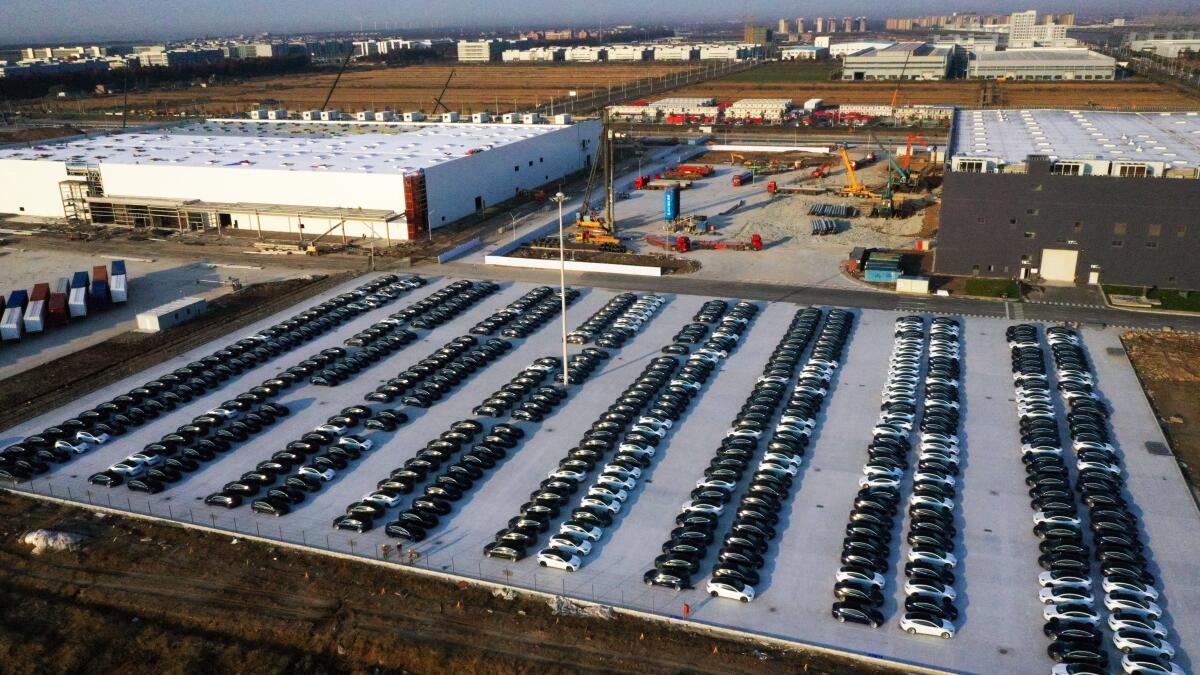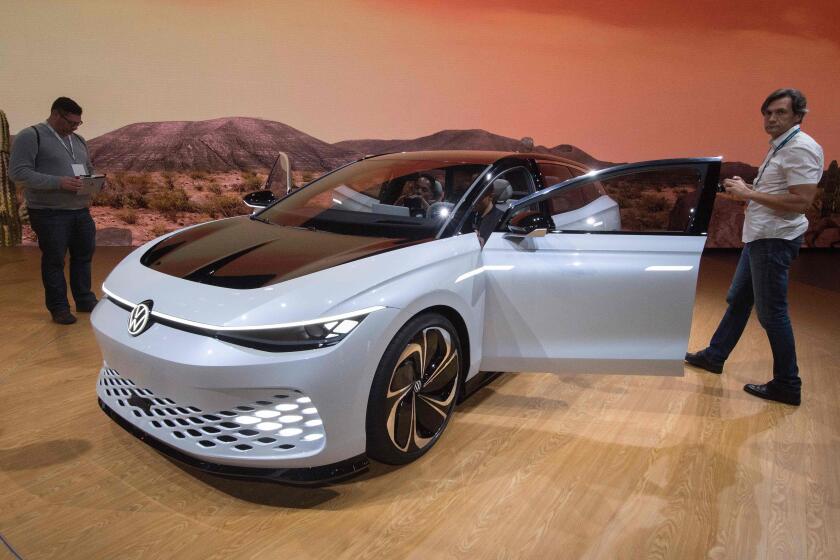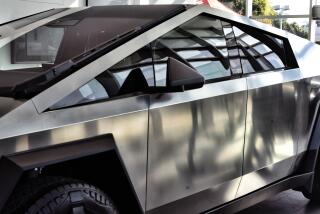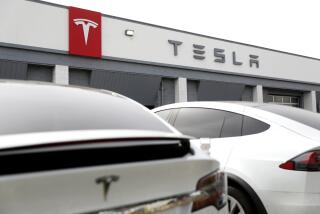Tesla meets Elon Musk’s sales goal, and stock jumps to record high

Tesla Inc. said it delivered 367,500 vehicles in 2019, achieving the sales forecast issued by Chief Executive Elon Musk and propelling its stock to a new record high.
The Silicon Valley automaker finished 2019 on an upswing. Last year it opened a new manufacturing plant in China, scored a rare profit in the third quarter, and saw its stock price soar to record highs.
Tesla needed to deliver 104,000 vehicles in the fourth quarter to meet Musk’s 2019 forecast of between 360,000 and 400,000 vehicles.
Tesla delivered 112,000 vehicles in the fourth quarter. Of those, 92,550 were Model 3s, a growth rate of 16.3% over the previous quarter and 46% above the fourth quarter of 2018. The more expensive and aging Model S sedan and Model X SUV models saw a combined 19,450 deliveries for the quarter. That’s 11.8% higher than the previous quarter, but 37% below the fourth quarter of 2018.
The company pushed hard to deliver cars before the clock struck 12 on New Year’s Eve. That’s when federal Tesla tax credits of $1,875 per buyer disappeared. Tesla went to great lengths to help some customers take delivery of their cars in time to get the tax credit, paying one journalist who lives in Florida to fly to St. Louis so he could pick up his car before the end of the year. Customers flocked to Tesla’s factory and delivery hub in Fremont, Calif., on New Year’s Eve to take delivery of their cars, with many staying past midnight to complete paperwork.
Tesla’s stock price jumped as much as 5.5% on Friday morning and closed up 3% at an all-time high of $443.01.The shares started 2019 at $310.12 and plunged to $178.97 before recovering — sparked by the third-quarter profit — to a record high of $430.94 the day after Christmas. They closed the year at $418.33, up 35% for the year.
The delivery numbers put “a major feather in the cap of Musk & Co.,” Wedbush equity analyst Dan Ives said in a note to investors.
But Tesla bears insist the story’s not over. Mark Spiegel, who runs the Stanphyl Capital hedge fund, with a large short position in Tesla, said the stock remains grossly overvalued. “This is at best a slow-growth car company that — on a sustainable basis — loses a lot of money, yet is priced at over 10 [times] the valuation of comparable automakers,” he said.
A growing number of carmakers will arrive at the L.A. Auto Show with battery powered or plug-in hybrid SUVS and crossover utility vehicles.
Each quarter’s deliveries feed into Wall Street’s shifting views of Tesla’s prospects. The uncertainty is typified by the long-range target prices for Tesla stock issued in early December by Morgan Stanley analyst Adam Jonas: $500 for the “bull” case, $250 for the “base” case, and $10 for the “bear” case.
Jonas’ bull case hinges on tremendous sales growth, enthusiastic customer response to the upcoming Model Y compact SUV, and rapid acceptance of Tesla’s controversial Autopilot and “Full Self Driving” driver assist technologies. Musk has promised those technologies will create 1 million completely driverless Tesla robotaxis by the end of this year (an outcome that no one in the driverless industry outside of Tesla has said is possible).
The bear case predicts that Tesla overall sales growth will hit a wall and that Musk will fail to execute on robotaxis and long-promised but as-yet undelivered products such as a Tesla semi truck and an expensive roadster sports car.
Sales in China of Model 3s built at the new plant in Shanghai are expected to account for a rising share of overall Tesla sales. A recent report from JL Warren Capital predicted Tesla China sales of 44,686 vehicles for 2019 and 68,400 in 2020. That’s a tremendous growth rate considering the new plant began production in late December. The facility is being built to turn out 150,000 cars a year in 2020, and, ultimately, at an annual rate of 500,000. Selling anywhere close to those numbers would bolster the bull view of Tesla’s stock.
The fourth-quarter delivery numbers were highlighted by big sales in the Netherlands, where rich tax incentives for electric cars were dramatically reduced on Jan 1. Tesla doesn’t break out Europe sales by country, but according to Kentekenradar, which publishes daily Dutch fleet data updates, more than 12,000 Model 3s were registered in the Netherlands in December alone. That’s more than double the car’s previous best month in September.
A growing army of hot rodders is cannibalizing crashed electric cars and turning them into custom vehicles with electric power trains.
Musk expects dramatic Europe growth. In the midst of Tesla’s year-end stock run-up, the CEO announced plans to build an auto plant in Germany, near Berlin. If it’s built, that could add capacity for another 500,000 cars.
Those ambitions must be matched against the phasing out of the United States’ federal electric-car subsidies that once totaled $7,500 per customer but dwindled to $1,875 in July and ran out completely Jan. 1, as Tesla’s total sales volume topped 200,000 vehicles a year. General Motors’ EV customers will lose federal subsidies this year.
Other carmakers, including those that jumped into the EV market in 2019 — Jaguar, Audi, Hyundai and Kia — still qualify for the federal customer discounts. More EV models are due out this year. Whether that’s enough to present an electric car challenge to Tesla remains to be seen.
Bloomberg contributed to this report.









